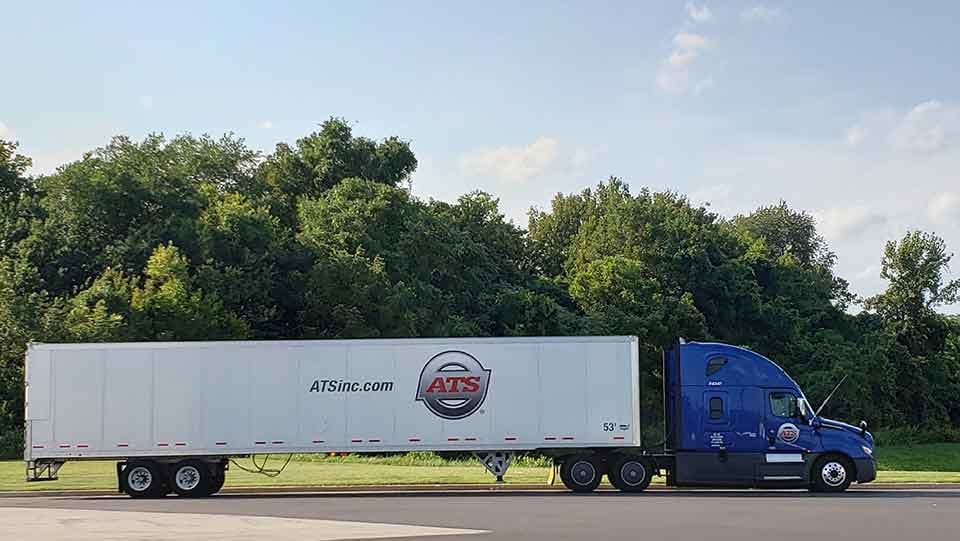In the trucking industry, shipments are classified according to the distance they need to travel. The general guidelines are:
- Short haul: Any shipment under 250 miles
- Mid haul: Shipments 250-400 miles
- Tweener: 401-800 miles
- Long haul: 801-1,200 miles
- Extended long haul: More than 1,200 miles
Every length of haul has its own challenges. While long haul and extended long haul distances famously keep drivers away from home for days or weeks at a time, short-haul loads create different challenges for the driver and carrier.
Here at Anderson Trucking Service (ATS), we have drivers who specialize in all lengths of haul. Since 1955, we’ve moved freight along almost every route you can imagine. And our experienced team moves short-haul loads on a daily basis.
In this article, you will learn more about short routes and what drives the cost of shipping these loads. You will also learn how to make your short-mile freight more attractive to trucking companies — which can lead to savings and convenience on your next shipment.
What Are the Fixed Costs on Short-Haul Loads?
Fixed costs in trucking include vehicle maintenance, fuel, and driver pay and benefits. Short-haul loads have these same expenses. The difference is that these costs are dispersed over fewer miles, potentially making the per-mile cost higher than a longer haul.
No matter the length of haul, drivers are bound by government regulated Hours of Service, which dictate the number of hours they can drive before a mandatory rest period. At ATS, we estimate that a driver using all their hours of service can travel about 500 miles on a good day.
This 500-mile estimate is longer than one short haul. Drivers are often paid based on their miles traveled. Since they understandably want to maximize their income, they may not want to take a less profitable load — unless they can combine it with another, or if it fills a different need (like getting home).
Carriers may also be hesitant to tie up a truck and driver for a short haul. They want to keep drivers busy and on the road to serve as many customers as possible.
Of course, in trucking there are always multiple factors that drive the price of a load, and short loads are no different. Knowing how companies price your load can help you find more competitive quotes.
What Drives the Cost of Short-Haul Freight?
By definition, short hauls stay within one geographical area. The price of the haul will fluctuate based on what is happening in that region — weather conditions, fuel surcharges, local labor markets and more. Even if you regularly move freight over the same short lane, those variables and others will cause the price to fluctuate over time and even week to week.
Short hauls use drivers and trucks based in the region. This can positively or negatively impact the cost of moving around your area.
- Areas with an abundance of trucks and drivers will benefit from competition. Some drivers may be willing to haul the load for a lower profit in order to work close to home.
- If your area does not have a plentiful supply of drivers and trucks, it will be harder to find someone to haul your freight. Given the choice, drivers will not drive a short lane where they make less money and are not home that night.
Changes to the local economy will also impact the cost of short-haul freight. If your region is heavily invested in one industry, ups and downs in that industry will be reflected in the price of short-haul shipping. If a major shipper closes, you will have an abundance of drivers and trucks available — leading to lower prices. If a major local industry is booming, there may not be enough trucks available, which means you need to pay a premium to secure one.

Many transportation companies also have a series of regional hubs where they have offices, mechanical shops and other infrastructure. Moving a truck into or around one of these hubs gives the carrier a way to get their vehicles to a preferred destination, and they may be willing to charge a lower rate for that trip.
Additional tasks and requests of the driver can also make short loads less attractive. If a driver is willing to take a smaller profit by taking a short haul, they may not be willing to also do tasks like tarping — especially if the weather is bad.
Understanding what drives the price is the first step in initiating a short-haul load. Now it’s time to take it one step further and use this information to potentially lower the price of your load.
How to Save on Short Mileage Freight Loads
In the transportation industry, there are often shortcuts or “hacks” you can use to become a better customer. In addition to the basics like being polite and prepared, paying on time and providing accurate information about your load, there are some tricks specific to short hauls that can save money.
Be flexible with your timeline. Drivers may be more willing to drive a short haul if they can combine it with another load, or with a trip home. If you have a window of several days (or even longer) when your freight can be moved, include that timeline in your specification.
Allow variations to trailer type. If dry van freight could be tarped and hauled on a flatbed, that increases the number of vehicles that can accommodate your load. Conversely, if a load can ship in a dry van rather than under a tarp, be sure to include that in your specification. A larger pool means more chances of finding a driver.
Provide accurate information. Starting with a thorough quote request, including the type of commodity, dimensions,special requirements and addresses for both the origin and destination makes it easier for carriers and brokers to provide an accurate quote. Making things easier may make your freight more appealing.
Accurate information also includes whether your freight needs special handling, such as tarping or dunnage. If the driver arrives onsite to pick up your freight and it is not as expected, the driver may refuse to carry your load, and/or you might be charged accessorial fees for the additional unexpected work. When you are already paying a higher per-mile rate, avoiding add-on fees is critical.
Build relationships. Competition is the name of the game in transportation. If you have a wide network of providers who you have worked with in the past, there’s a chance one of them may be willing to take your load. While it’s not impossible to source a new provider on a short load, the nature of these less-profitable loads makes it less likely.
While not all short-haul loads are flexible enough to use these resources, being creative when requesting quotes may help you stay within your budget.
Get Accurate Pricing When Shipping Any Distance
The fluctuating price of short-haul loads can be confusing, especially for inexperienced shippers. It can also cause frustration for your accounting department and others who are helping create your budget.
Understanding the market and the variables that impact rates will help you explain the cost differences and give you leverage to potentially save on future shipments. While you may not be able to negotiate on all your shipments, you may be able to creatively work with carriers to find mutually beneficial solutions. For example, can you send your short-haul load during the week?
No matter the length of haul, the transportation industry is dynamic and always changing. Short loads and their pricing are no exception. If you’re looking for a reliable partner, ATS would love to help.
Interested in learning more ways to save money (and time, and headaches) on shipping? Subscribe to our Learning Hub to become an expert in all things trucking.





